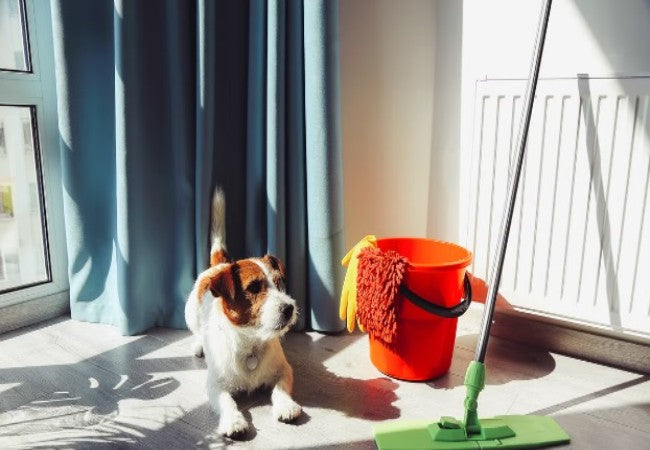5 Common Cleaning Products That Could Harm Your Dog in 2025: A Veterinarian’s Guide to Pet-Safe Cleaning 🐶🐾

In this article
5 Common Cleaning Products That Could Harm Your Dog in 2025: A Veterinarian’s Guide to Pet-Safe Cleaning 🐶🐾
By Dr. Duncan Houston BVSc
As a veterinarian, I often advise pet owners to be cautious about the cleaning products they use in their homes. Many common household cleaners contain chemicals that can be harmful to dogs, leading to a range of health issues. Understanding these risks is crucial for maintaining a safe environment for your furry friend.
1. 🚽 Toilet Bowl Cleaners
Overview: Toilet bowl cleaners often contain corrosive agents like hydrochloric acid. If your dog drinks from the toilet, especially after cleaning, they risk ingesting these harmful chemicals.
Risks:
- Oral and esophageal burns
- Vomiting and diarrhea
- Severe internal injuries
Prevention Tips:
- Keep toilet lids closed at all times.
- Use pet-safe toilet cleaning alternatives.
- Restrict your dog's access to bathrooms.
2. 🧺 Fabric Softeners
Overview: Fabric softener sheets and liquids contain cationic detergents, which can be toxic to dogs if chewed or ingested.
Risks:
- Oral ulcers
- Vomiting
- Intestinal blockage
Prevention Tips:
- Store fabric softeners out of your dog's reach.
- Dispose of used sheets properly.
- Consider using pet-safe laundry products.
3. 🧼 Counter Cleaners
Overview: Many counter cleaners contain chemicals like ammonia and bleach, which can be harmful if your dog licks treated surfaces.
Risks:
- Skin and eye irritation
- Respiratory issues
- Gastrointestinal distress
Prevention Tips:
- Use pet-safe cleaning products.
- Ensure surfaces are thoroughly rinsed and dried.
- Keep your dog away from cleaned areas until safe.
4. 🧪 Bleach-Based Cleaners
Overview: Bleach is a powerful disinfectant but can be dangerous to dogs if inhaled or ingested.
Risks:
- Respiratory irritation
- Skin burns
- Gastrointestinal issues
Prevention Tips:
- Use diluted bleach solutions when necessary.
- Ensure proper ventilation during cleaning.
- Keep your dog away from areas being cleaned with bleach.
5. 🧴 Phenol-Based Disinfectants
Overview: Disinfectants containing phenol, such as some types of Lysol, can be toxic to dogs, especially if they come into contact with treated surfaces.
Risks:
- Liver damage
- Neurological issues
- Skin and mucous membrane irritation
Prevention Tips:
- Read labels carefully and avoid phenol-containing products.
- Opt for pet-safe disinfectants.
- Prevent your dog from accessing recently disinfected areas until they are dry and safe.
📱 Enhance Your Dog's Safety with Technology
Modern tools can assist in managing your dog's health and safety effectively:
- Ask A Vet App: Access expert veterinary advice and schedule consultations conveniently.
🎯 Conclusion
Being aware of the potential hazards posed by common cleaning products is essential for every dog owner. By choosing pet-safe alternatives and implementing preventive measures, you can ensure a clean and safe environment for your beloved canine companion.
For personalized guidance and support, visit AskAVet.com and download the Ask A Vet app today! 🐾📲






